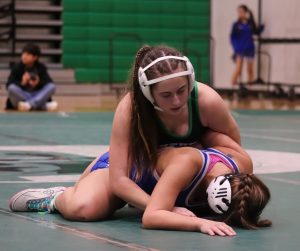Page 1 – Fahrenheit 260: Schools across country face book bans; no books have been pulled from DHS library
April 12, 2023
Across the country, teachers and schools are being forced to remove books from their collections. Pressure from parents, advocacy groups and political figures in conjunction with new laws to restrict what is allowed in a classroom is leading to a dramatic rise in bannings over the past three years. From July 2021 to March 2022 alone, Pen America found that 1,145 individual titles had been challenged.
This number includes books that were removed from school libraries, banned from classroom curriculums or removed from schools during investigations. Of those banned, most featured people of color, addressed race or racism or discussed sexual orientation. as shown in the info graphic.
School librarian AnnElise Irick attributes this sharp rise in book bannings to a changing of the times – and a swinging of the pendulum.
“If you look back through history, there’s a pendulum that’ll swing way to one side and then the other side will rise up and it’ll swing way to the other side, and it’s hard for the pendulum to just kind of hang in the middle,” Irick said. “So I think we’re just seeing the pendulum swing to one side; it’s kind of like if one person brings something up, then other people tend to jump on board.”
In Florida, thanks to new laws passed last year, any collection of books inside a school – including classroom collections and teacher’s libraries – are under review, and subject to censorship. Florida teachers were forced to remove books from their rooms, or block them from sight, until a media specialist could come into the school and vet every book in the room.
The criteria for what can get a book banned has become simultaneously more strict and less clear. Anything deemed harmful to a child – a vague description which can include any discussions of sexuality, race or violence of any kind – can put a book at risk.
Supporters of these laws and policies say that children should not be exposed to sexually explicit material, despite the fact that these laws do nothing to prevent sexually explicit material from appearing in schools.
“One of the issues with book banning is that it is based on people’s personal agendas,” sophomore Lin Lindstrom said. “So they apply their own personal opinions onto an entire community, which takes away access to certain content that can be helpful for kids who are going through the same experiences that may be presented inside the novel.”
The language of HB 1557, just one law passed to censor classroom materials and better known as the ‘Don’t Say Gay’ bill in Florida, specifies that school districts will be prohibited from “discussion about sexual orientation or gender identity in certain grade levels,” while having no mention of sexual education.
“Say that a book has a character who’s going through a gender identity crisis and a child, or a teenager or an adult who is going through that same type of gender identity crisis, can read that book and then find themselves in it and find better ways to deal with their situation through how the character dealt with it,” Lindstrom said.
Last year, a DHS student’s grandparent raised objections to Sherman Alexie’s novel “The Absolutely True Diary of a Part-Time Indian,” which was taught in some sophomore English classes.
After being reviewed by a district committee consisting of teachers, administrators, a media specialist, district employees and community members, the book was banned from class curriculum and removed from the middle school libraries.
The book remained in the high school library as an option for students to check out on their own time.
Despite worries that Alexie’s book and others could be fully removed from the school, Irick says that “so far Derby has not had any books challenged or banned in the library.”
In a document released by the committee outlining why the decision to remove the book was made, reasons given ranged from the amount of profanity and concerns over the “difference between lexile level and mature content in the book” to concerns over “how might profanity and sexual content affect girls in class as a required read.”
No concern was raised over how these topics would affect male students.
In response to the ban, former Derby City Council member Cheryl Bannon asked the district committee to review the Bible. She requested this as a way to point out the dangers and hypocrisy of book banning, citing that the Bible – a book taught in DHS’s Bible as Literature class – also contains profanity and sexually explicit content. The committee chose not to remove the Bible from the school curriculum.
“Just because someone doesn’t like something doesn’t mean it should be banned or taken away from someone who could learn or benefit from it,” sophomore Hayley Brumbelow said.
Historically, book bans have been initiated by concerned citizens – more often than not parents of current students. However, this seems to no longer be the case.
Challenges are now coming from advocacy groups such as Moms for Liberty and County Citizens Defending Freedom, as well as politicians such as Matt Krause.
In 2021, Krause, a former Texas state representative, sent a list to Texas school districts that included 850 book titles. Along with this list was a letter, which requested that school districts tell Krause how many copies of each book on the list the district was in possession of and the amount of money each district spent to obtain those books.
He then asked each district to report any other books that contained or addressed human sexuality, HIV or AIDS, sexually explicit content or discussions of race or sex that “might make students feel discomfort, guilt, anguish, or any other form of psychological distress.”
This letter is just one example of many challenges to books relating to race and sexuality. The letter unabashedly shows that book bans are disproportionately targeting and affecting books written by and focusing on people of color and lgbtqia+ individuals.
“I think most people, if they have a belief one way or the other, they feel very, very strongly about it and it’s usually the most opinionated people that you hear – either way– on either side of a subject,” Irick said.
“And so I think it’s just … they feel very strongly about something and they want to see their belief in the entire district because they also probably care about the district and are invested in it. And so I think when people feel very strongly about something they feel like everybody should believe that way whether it’s right or wrong.”
Despite the range of backgrounds, beliefs and families found in school districts, one person’s objections can limit another’s ability to access a book that may reflect their own lives and experiences.
People are not all the same, and people’s experiences are not all the same, and what may be obscene or offensive to one, may be another’s reality.
“Books often help with teenagers who tend to go through a lot,” Brumbelow said.
“I feel like every teenager has their own experience and goes through different things and books can often provide examples of what they may be going through. So it’s relatable, it’s comforting, it’s all of those really good things. And taking away books, especially away from teenagers, can be a really crucial and bad decision.”





